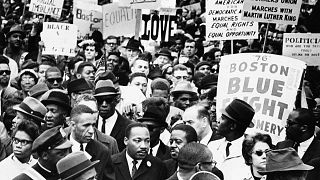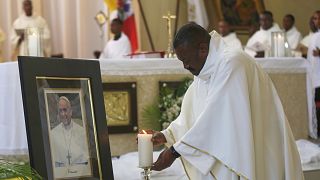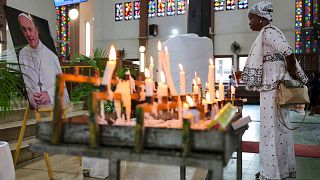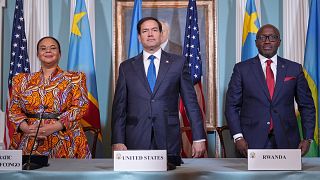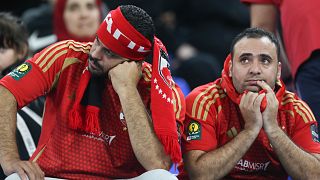A French court’s decision to dismiss a case brought against a group of French soldiers accused of sexually abusing children while on deployment in the Central African Republic in 2013-2014, has sparked anger in the country.
Paris prosecutors called last year for the case to be dismissed because some of the testimony was deemed inconsistent and some elements could not be confirmed, even if they could not exclude that abuses took place.
The decision was met with frustration in CAR’s capital, Bangui, where repeated allegations of sexual misconduct have helped fuel anger towards French and U.N. troops deployed there.
“I don’t really believe that, because those of us who live here in the Central African Republic, we heard what happened, we heard the testimonies regarding those who committed the atrocities and today, they are telling us that these people were let go, which could be due to a lack of evidence. I would say that it’s probably because of a lack of evidence and it bothers me a lot because given that we had heard all the testimonies here in Bangui, and how they were involved in many crimes, especially when it comes to sexual abuse,” said Guy Herve Gbangolo, a lawyer for the victims.
The country’s justice minister was not immediately available for comment.
The accusations emerged in April 2015 after the leak of an internal U.N. document containing the testimony of six children who said they were sexually abused by French soldiers in exchange for rations while at a displacement camp in Bangui.
The abuse was alleged to have taken place between December 2013 and June 2014 after France intervened in its former colony to stem violence between Christian militias and largely Muslim Seleka rebels.
According to the leaked U.N. report, at least 13 French soldiers, two from Equatorial Guinea and three from Chad were implicated in the abuse.
The then French president, Francois Hollande, promised to show no mercy if the allegations were confirmed.
The French soldiers were not operating under U.N. command at the time. A later U.N. mission, known as MINUSCA, has been accused of widespread misconduct.
In the streets of the capital, many condemned the ruling.
“The French justice system should condemn the Sangaris (peacekeeping mission) who were in Central Africa, instead of protecting the people of Central Africa, they used their power to rape children, and I don’t think that it’s normal. I strongly condemn this decision,” said resident, Barbara Sangha.
“Why did France decide to dismiss the case of these soldiers, who are guilty of their crimes towards these girls? It’s really worrying for us. We protest this decision and many people have raised their voices to protest this judgement by the French courts,” said another resident, Alfred Salamatou.
“I think it’s a political decision because the French court took this decision to cover up for the French troops who came to commit these crimes on children in this country,” added Bangui resident, Bruno Hyaceinte Gbiegba, a member of civil society.
ECPAT, an organisation that campaigns against the sexual exploitation of children, told Reuters it did not rule out the possibility of appealing the magistrates’ decision, an option that was supported by some Bangui residents.
France intervened in CAR, a former colony, over two years ago to stem violence between Christian militias and largely Muslim Seleka rebels who had seized power.
It started withdrawing some of its 2,000 troops last year, handing over to U.N. peacekeepers.




